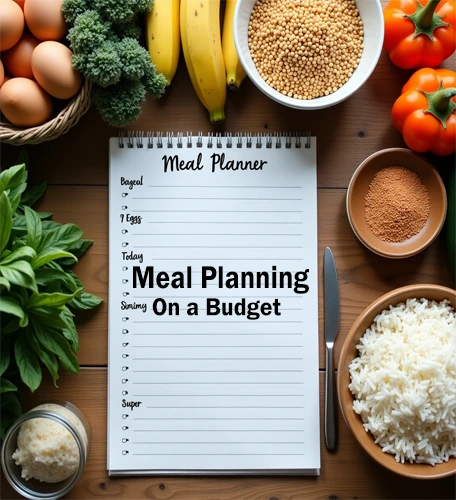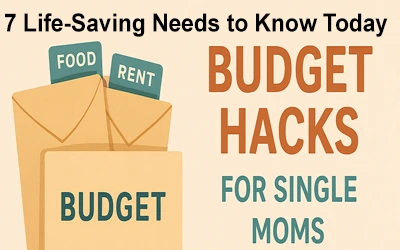
Meal Planning On a Budget
Meal Planning on a Budget: The Survival Strategy Every Family Deserves
“How on earth do I keep feeding my family without draining my wallet?”
If that thought keeps nagging you every time you peek inside your fridge or swipe your debit card — trust me, you’re far from alone. These days, “meal planning on a budget” isn’t some passing fad. It’s become a daily survival tactic. Especially now, when grocery prices feel like they’re climbing a ladder — and our incomes are stuck on the bottom step.
Feeding a family isn’t just about cooking anymore — it’s emotional, mental, and financial stress rolled into one. But what if there was a simpler, repeatable method that didn’t require gourmet skills or hours of prep — just a solid plan?
This guide is that method — built around the real needs of real families trying to stretch every dollar without compromising on food or dignity.
Easy weekly meal plans for low income families
What Meal Planning on a Budget Actually Looks Like
When most people hear “meal planning,” they picture Pinterest-worthy chalkboards and perfect lunchboxes lined up in rainbow order. But let’s be honest — real life looks very different.
Meal planning on a tight budget means making practical choices that keep your family full without stretching your grocery bill past its limits. Choose lentils instead of last-minute fast food. Know what’s already in your pantry and focus on what you can actually afford this week — not what looks pretty on an app.
Most importantly, don’t think of it as deprivation — think of it as having a system that works.
A Weekly Budget Meal Plan That Actually Works (Even for Large Families)
Ever opened your fridge and felt like you’re looking at a graveyard of half-used leftovers and sad vegetables?
Here’s a $60/week meal plan many families have followed — and it actually works:
| Day | Breakfast | Lunch | Dinner |
|---|---|---|---|
| Monday | Oats + banana | Leftover rice + egg curry | Chicken stew + bread |
| Tuesday | Toast + peanut butter | Lentil soup | Pasta with frozen vegetables |
| Wednesday | Scrambled eggs | Tuna sandwich | Vegetable curry + rice |
| Thursday | Pancakes | Hummus wrap | Grilled chicken + mashed potato |
| Friday | Cereal + fruit | Rice & beans | Homemade pizza (cheap version) |
| Saturday | Boiled eggs | Mac & cheese | Stir-fried noodles |
| Sunday | French toast | Veg fried rice | Fish curry + rice |
The idea? Reuse ingredients, cut down food waste, and make meals both affordable and kid-friendly.
Where Most Grocery Budgets Go Sideways
Even with a great meal plan, your budget can fall apart at the grocery store if your list isn’t tight.
Here’s where people usually trip up:
Paying extra for brand names when generics taste the same
Buying in bulk… and watching half of it go bad
Shopping while hungry (seriously — don’t!)
Skipping the list and grabbing random things
Here’s a stripped-down grocery list to match the sample plan:
Bulk rice
Lentils
Eggs
Pasta
Frozen vegetables
Potatoes
Chicken (grab deals or buy in bulk)
Bread (freeze half)
Peanut butter
Bananas
Canned tuna
Canned tomatoes
Flour (for pancakes and pizza dough)
Start with this core list and adjust based on what’s in season or on sale.
Save Big with Seasonal Grocery Swaps
Want to stretch your grocery money even further? Don’t ignore the power of seasonal shopping.
Seasonal fruits and veggies are often cheaper, tastier, and last longer in your fridge.
Here’s why it works:
Lower prices when items are in harvest
Better taste and nutrition from produce picked at peak ripeness
Less spoilage, so less waste
Try These Swaps:
| Instead of… | Choose… |
|---|---|
| Expensive apples | Local bananas or guava |
| Frozen mixed veggies | Fresh pumpkins or beans |
| Off-season berries | Pineapple or watermelon |
Want bonus points? Make a tiny monthly “seasonal shopping calendar” — it’ll help you steer clear of overpriced produce.
Cheap and healthy meals for the whole week
Budget Lunchbox Ideas for Kids (They’ll Actually Finish!)
Packing school lunches doesn’t mean you need to buy overpriced snack packs. You can make meals that are healthy, affordable, and fun to eat — all under $2 each.
Here are 5 easy wins:
Egg Sandwich + Fruit Slices
Mash boiled eggs with a little mayo and pepper, sandwich it between toast, and add fruit on the side.Mini Veggie Wrap + Yogurt Cup
Use leftover chapati or tortillas, add stir-fried veggies, and pair it with homemade yogurt.Colorful Fried Rice
Leftover rice + boiled egg + peas + soy sauce = kid-friendly magic.Banana Pancakes + Peanut Butter Dip
Mash a banana, mix with flour and egg, fry it up. Add a tiny pot of peanut butter for dipping.Lentil Soup + Bread Slice
Pour some hot dal into a thermos, and toss in a piece of toast or paratha.
Simple. Cheap. And surprisingly loved by picky eaters too.
Pro Tip: Let your child choose one lunch idea every week. When they have a say, they’re more likely to eat it!
How to meal prep without overspending
Meal Prep Habits That Actually Save You Time and Stress
If your evenings feel like chaos, meal prep will be your lifesaver. And no — it doesn’t need to be fancy.
Here’s how to simplify:
Cook in batches — Make extra curry, rice, or soup on weekends and freeze in small containers.
One big chop session — Cut all your onions, carrots, and greens for the week in one go.
Stick a planning sheet on the fridge — You’ll never again stand in the kitchen wondering what to make at 6 PM.
It’s not about being perfect. It’s about setting up routines that make life smoother.
Common Budget Meal Planning Mistakes (And How to Avoid Them)
Even the best plan can flop if you fall into these traps:
Trying to cook too many dishes — 14 different meals in 7 days? Not sustainable.
Buying weird ingredients you’ll never touch again
Forgetting to check your fridge and pantry before shopping
Wasting leftovers — Mix, match, and reheat creatively.
Quitting after a bad week — It’s a long game, not a one-hit fix.
Treat meal planning like brushing your teeth. Keep doing it — even when it’s boring.
Frugal meal planning for busy parents
Real-Life Sample Budget Plan (Flexible + Foolproof)
Need something even simpler?
Here’s a plan built around bulk buys and busy schedules:
Days 1–3:
Cook a big batch of chicken thighs with onions, garlic, and basic spices
Make 4 cups of rice — freeze half
Boil potatoes and carrots as a side
Days 4–5:
Stir-fry leftover veggies with rice
Use chicken bones to make broth — add noodles
Days 6–7:
Pasta night! Just tomato sauce + herbs
Scrambled eggs and toast (classic weekend rescue)
Bonus Tip: Think “planned-overs.” Make extra intentionally so it becomes a new meal the next day.
Get a Fast Food Break
Let’s be real. Sticking to a meal plan takes effort. And sometimes? You deserve a little reward.
Want a no-cost treat for your family?
How about a $50 fast food voucher — no strings attached.
👉 Click the “Claim Fast Food Reward” button below and claim the reward
It’s a small thank you for doing the smart, frugal thing. Enjoy it guilt-free!
Download Your Budget Meal Planner
Skip the guessing. I made a simple printable that helps you meal plan like a pro.
- Map out your meals.
- Track what you need to buy.
- Cut down food waste.
- Stay under budget every week.
No login. No signup. Just smart help for smart families.
Simple grocery budget meal plans
Frequently Asked Questions
Q. How does meal planning really help save money?
Answer: Look, honestly, when you sit down and plan your meals, you kinda stop buying random stuff that looks good but you never eat. Like, I used to grab snacks thinking, “Oh, this is cheap,” but then it just rotted in the fridge. Planning makes you buy just what you need. And cooking at home? Way cheaper than eating out every time. So yeah, it’s about not wasting money on useless stuff.
Q. What’s a quick and cheap meal plan for busy people?
Answer: Man, when life is hectic, just keep it simple. Eat oatmeal or eggs for breakfast. For lunch, maybe a sandwich or rice and beans — nothing fancy. Dinner can be pasta or veggies stir-fried with whatever you have. And cook more on weekends to avoid scrambling during the week. No stress, just eat and keep it cheap.
Q. Is cooking at home cheaper than ready meals?
Answer: Mostly, yeah. Sure, it takes time, but those ready meals and take outs charge extra for “convenience.” When you cook yourself, you know what’s going in, you control the cost. Batch cooking helps tons — cook once, eat twice or thrice. Plus, it’s healthier, no mystery ingredients.
Q. Can I eat healthy if groceries get more expensive?
Answer: Definitely. You don’t need expensive “superfoods” or anything. Beans, rice, frozen veggies—they’re cheap and good for you. Buy fruits and veggies when they’re in season, they cost less and taste better too. Skip the processed stuff; it’s pricey and usually junk food.
Q. Are there apps to help me plan meals and save money?
Answer: Yep, try apps like Mealime or Yummly. They help you pick recipes based on what you like and what’s in your kitchen. Plus, they make grocery lists so you don’t buy extra junk. Most of the good stuff is free or low cost
Q. How can I feed a family of four on $50 a week?
Answer: Stick to basics like rice, beans, eggs, frozen veggies, and maybe chicken thighs or canned tuna. Plan meals so ingredients are used more than once — nothing goes to waste. Avoid snacks and extras. Cooking from scratch saves a lot.
Q. What groceries should I buy for budget meals?
Answer: Focus on rice, pasta, beans, potatoes, carrots, onions, eggs, peanut butter, frozen veggies. Buy in bulk if you can and keep an eye out for sales. Canned tomatoes and frozen chicken are cheap proteins that last long.
Q. How do I pack cheap, healthy lunches for kids?
Answer: Simple is best. Boiled eggs, peanut butter sandwiches, fruit slices, homemade pasta salad. Avoid buying fancy snacks—they’re expensive. Prepare lunches the night before, and ask kids what they want sometimes — they’ll eat better if they pick.
Q. What’s the best cheap protein for meal planning?
Answer: Eggs, beans, lentils, canned tuna, frozen chicken, peanut butter, tofu. Mix plant and animal proteins for variety and nutrition without spending much.
Q. How to save money with seasonal vegetables?
Answer: Buy what’s in season near you. Seasonal veggies cost less and taste better. Like pumpkins in fall, tomatoes in summer. Build meals around these — saves money and tastes fresh.
Final Words: Make Budget Meal Planning a Way of Life
Here’s the truth — meal planning on a budget isn’t about perfection. It’s about consistency.
How to keep going:
Rotate your family’s top 10 favorite meals
Freeze extra portions in labeled containers
Shop groceries just twice a month to reduce impulse buys
Involve your family in the planning
Be kind to yourself — some weeks won’t go to plan
You’re not just feeding your family. You’re creating rhythm, care, and stability. That’s real power.
And every family? Deserves exactly that.



